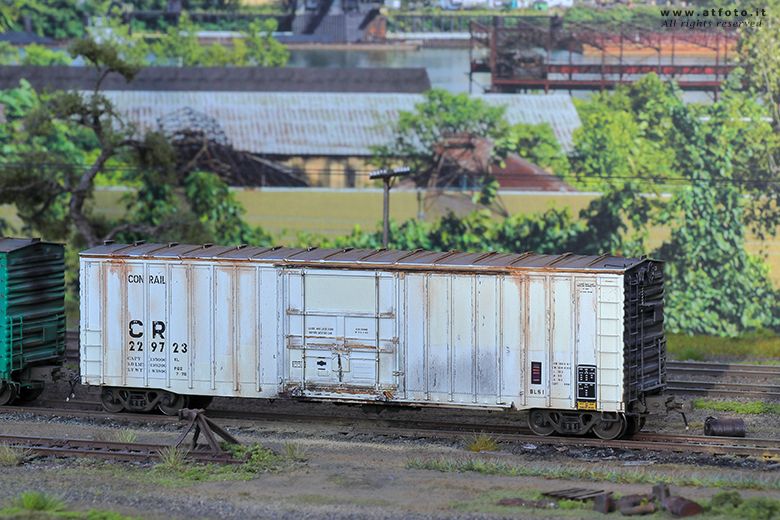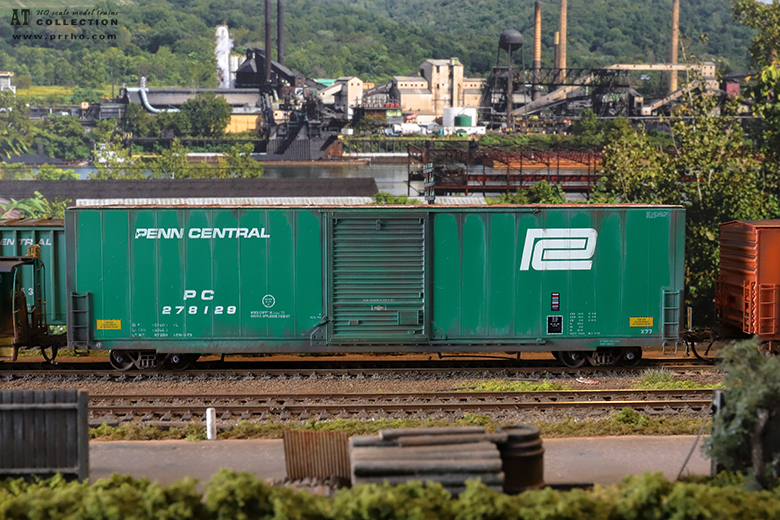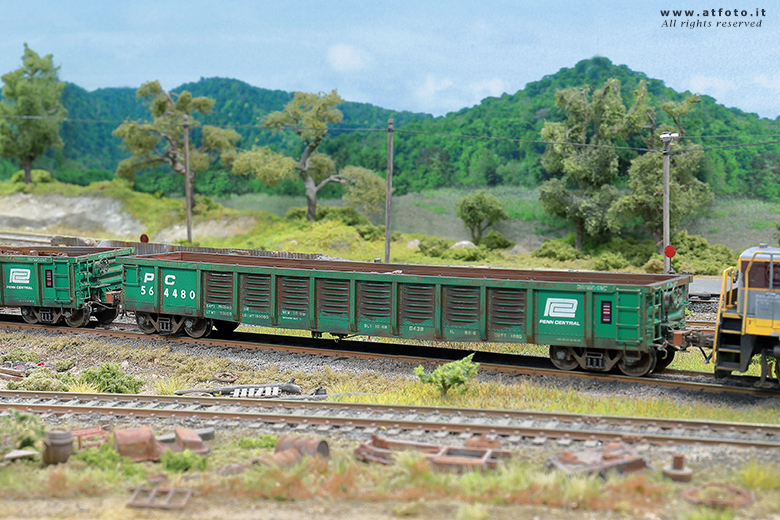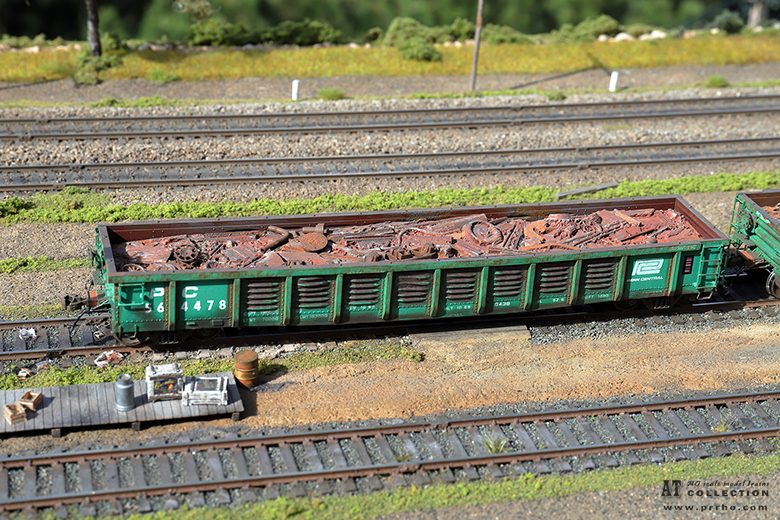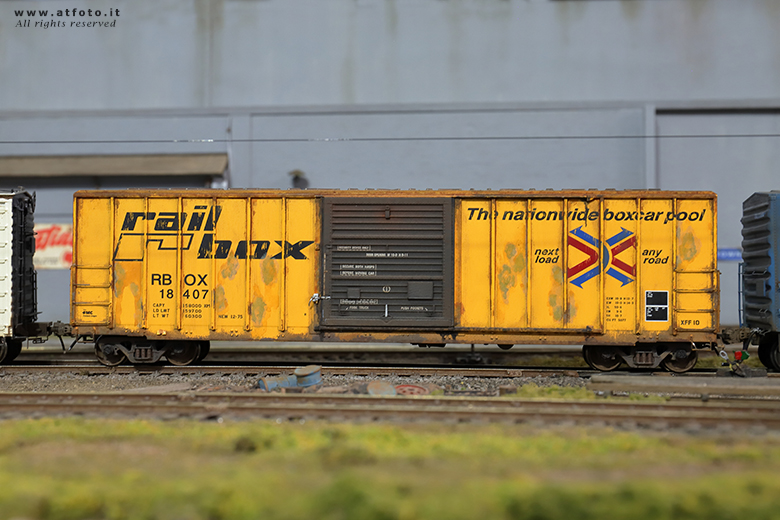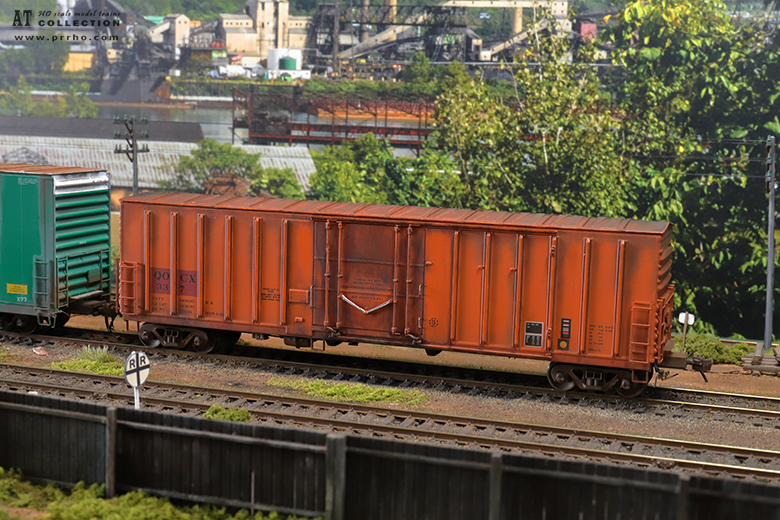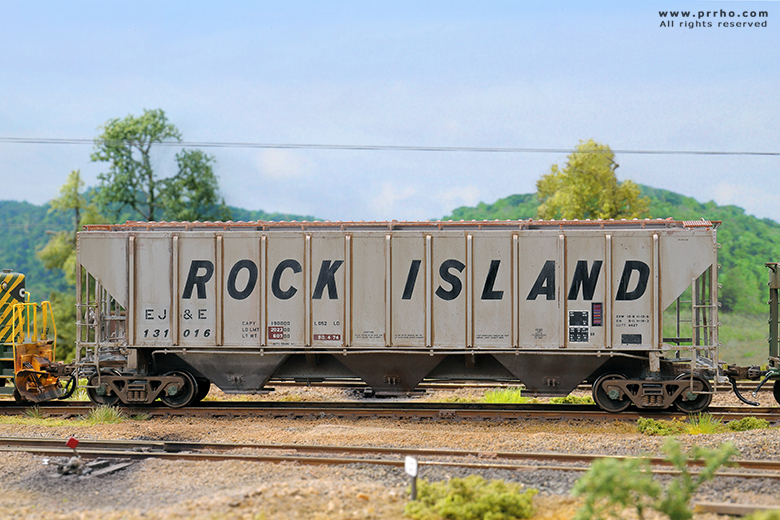
CONRAIL

65'6" Mill Gondola #593300 (1977)
First built by General American in the early 1940’s, the mill gondola was designed for steel mill shipments that required extra length and versatility.
The sturdy riveted construction could carry the necessary weight plus both end panels were hinged to fold inward.
This allowed long beams and other extra-length loads to extend beyond the length of the car.
When carrying such loads, the mill gondola requires flat cars coupled to both ends to allow clearance of the overhanging load.
The sturdy riveted construction could carry the necessary weight plus both end panels were hinged to fold inward.
This allowed long beams and other extra-length loads to extend beyond the length of the car.
When carrying such loads, the mill gondola requires flat cars coupled to both ends to allow clearance of the overhanging load.
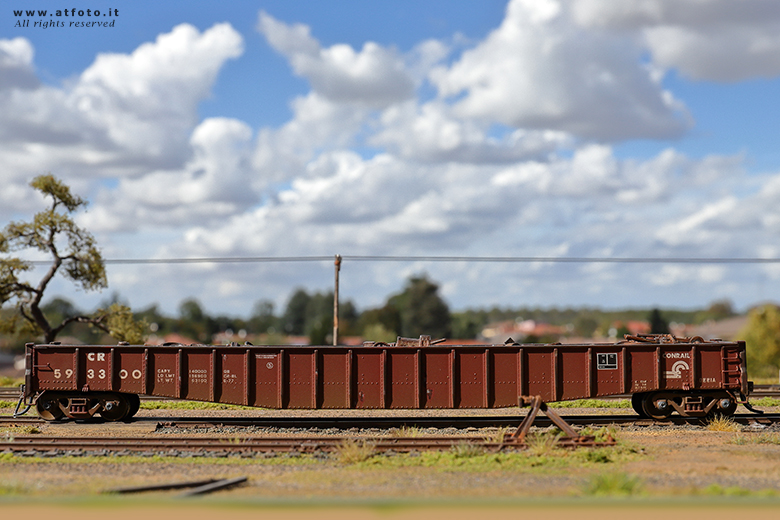

CONRAIL

50' X58 class boxcar #229723 (1976)
The X58 Class boxcar was one of the Pennsylvania's largest classes of boxcars.
At the Penn Central merger, just over 2,000 X58 and their subclasses were in service.
Many survived onto Conrail with the original heritage colors (CR patched) and/or repainted, as some units in former Lehigh Valley white livery.
At the Penn Central merger, just over 2,000 X58 and their subclasses were in service.
Many survived onto Conrail with the original heritage colors (CR patched) and/or repainted, as some units in former Lehigh Valley white livery.

PENN CENTRAL

60' 70-ton X77 class Berwick 7440 Appliance boxcar #278129 (1974)
This Hi-cube car was built and delivered in 1973 by the Berwick Forge and Fabricating Corporation in the former AC&F Berwick, Pennsylvania plant.
PC was the largest buyer and took delivery of 130 of them (equipment series 278045 - 278174).
The Illinois Central Gulf & Rock Island also acquired a handfull each.
Exactrail - Weathered.

PENN CENTRAL

50' X58 class boxcar #265753 (1974)
PENN CENTRAL

H30 class 3-bay covered hopper #32349 "sand service" (built 1936 PRR, rebuilt 1969 PC)
The Pennsylvania Railroad started building 70-ton H30 class covered hoppers around 1935.
During the '60's, the capacity of the remaining cars was increased to 77tons from 70.
At the time of merging between Pennsylvania and New York Central Railroad, with the creation of the Penn Central company,
remained in service around 1.000 exemplaries of H30.
Many "sand service" H30 covered hoppers were used on the first years of Conrail era.
During the '60's, the capacity of the remaining cars was increased to 77tons from 70.
At the time of merging between Pennsylvania and New York Central Railroad, with the creation of the Penn Central company,
remained in service around 1.000 exemplaries of H30.
Many "sand service" H30 covered hoppers were used on the first years of Conrail era.
Bowser - Weathered and improved (Kadee couplers).


PENN CENTRAL

G43b class corrugated side gondola #32349 "sand service" (built 1936 PRR, rebuilt 1969 PC)
The G43 class was a 52-foot, 6-inch interior length corrugated-side gondola first saw production in 1966.
Initially produced with a design based on "all panel corrugated", the following sub-classes later they had some changes.
The variant G43b have no corrugations in the outward two panels, as well as DSI (Despatch Shops, Inc., Rochester NY) corrugated ends.
Initially produced with a design based on "all panel corrugated", the following sub-classes later they had some changes.
The variant G43b have no corrugations in the outward two panels, as well as DSI (Despatch Shops, Inc., Rochester NY) corrugated ends.
The Pennsylvania Railroad and merger successor Penn Central built a total of 3.750 G43 / G43A / G43B / G43C gondolas
at the Sam Rea Shops in Hollidaysburg, PA, from 1966 to 1970.
at the Sam Rea Shops in Hollidaysburg, PA, from 1966 to 1970.
RAILBOX

50' single-door boxcar FMC-5077 type #18407 (1975)
The boxcar with the single-sliding door configuration is one of the best known and used widely by many different railroads.
These cars were produced using the Gunderson metal works which FMC had acquired in 1965.
In late 1975, FMC began producing a 5,077-cubic-foot Plate B boxcar for IPD and Railbox services.
The boxcar with the single-sliding door configuration is one of the best known and used widely by many different railroads.
These cars were produced using the Gunderson metal works which FMC had acquired in 1965.
In late 1975, FMC began producing a 5,077-cubic-foot Plate B boxcar for IPD and Railbox services.
TTX-HTTX-OTTX TRAILER TRAIN


60' trailer train flatcar ## (1968)


60' trailer train flatcar ## (1968)
TTX Company (formerly TrailerTrain and founded by Pennsylvania Railroad and Norfolk & Western Railway) a provider of railcars
and its "trailer flat cars" are the main option for many railroads about "piggybacking" train services.
From 1956 over 165.000 cars (flatcars, boxcars and gondolas) were built and leased at the major american railroads.
and its "trailer flat cars" are the main option for many railroads about "piggybacking" train services.
From 1956 over 165.000 cars (flatcars, boxcars and gondolas) were built and leased at the major american railroads.
Between 1964-1975, TrailerTrain (now known as TTX Co.) acquired a fleet of 5.000 modern 60' flats built by ACF, Thrall and Pullman Standard.
TTX cars were assigned to various classes to handle loads as auto frames, logs, military vehicles, farm equipment and construction equipment.
Some were even modified to handle TTX's bread and butter, intermodal containers.
TTX cars were assigned to various classes to handle loads as auto frames, logs, military vehicles, farm equipment and construction equipment.
Some were even modified to handle TTX's bread and butter, intermodal containers.
PICS COMING SOON!
Intermountain Railway Co. - Weathered and improved.


JERSEY CENTRAL LINES


50' N.A.C.C. boxcar auto #41030 (1964)
The 50' NACC boxcar was designed and built by the North American Car Corporation (NACC) in the early 1960s.
The car was an insulated boxcar (equipped with a plug-door) used to carry various commodities that are temperature sensitive.
The plug door offers better sealing of the car to maintain temperature and better protection from weather, theft, and other possible damages.
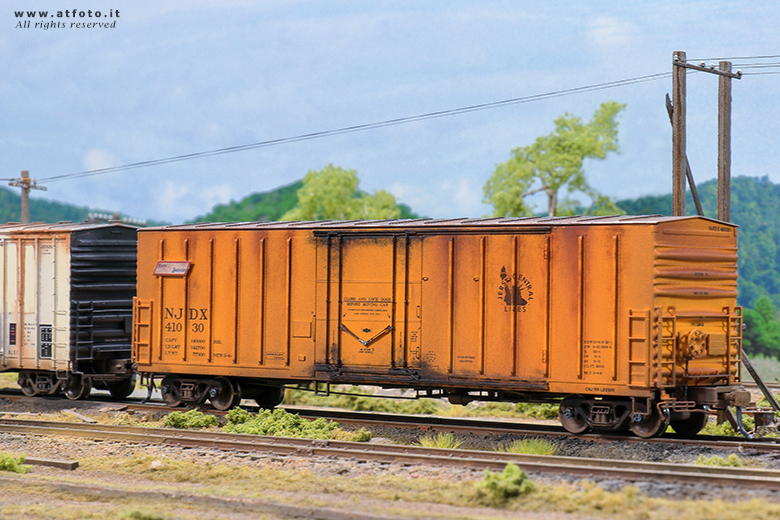
Athearn Genesis - Weathered and improved (Kadee couplers).

The car was an insulated boxcar (equipped with a plug-door) used to carry various commodities that are temperature sensitive.
The plug door offers better sealing of the car to maintain temperature and better protection from weather, theft, and other possible damages.

Athearn Genesis - Weathered and improved (Kadee couplers).

BOSTON & MAINE RR

50' PS-1 boxcar #77064 (1956 - 1977 repaint)
Pullman Standard built the longer version of its 40' PS-1 boxcar from 1952. The greatest variation was in the size and style of doors used.
Later, Pullman Standard also offered 60′ boxcars – also with the PS-1 designation.
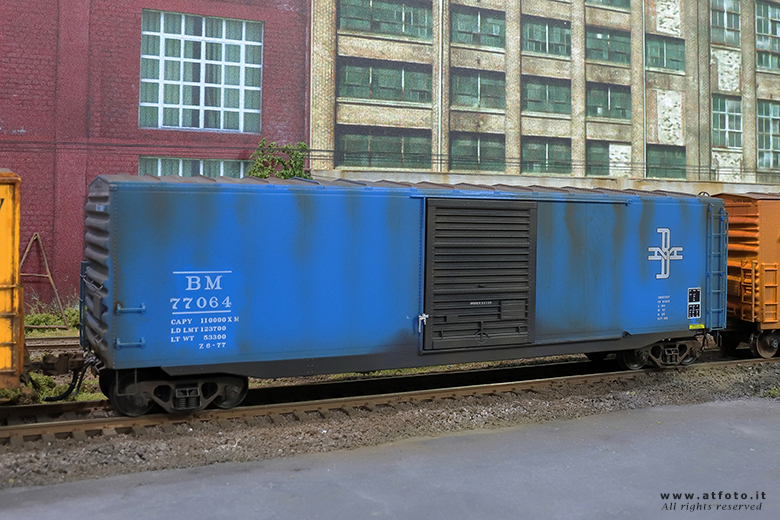
Kadee - Weathered.


Kadee - Weathered.

GOLDEN WEST SERVICE - GVSR (Galveston Railroad)

50' PC&F SS boxcar with 14' Plug Door #138058 (1966)
This Pacific Car & Foundry car was a common site on the rails from the 1960's to 1990's.
The various types of doors used on these cars and its carbody provided a more constant temperature and humidity
for more sensitive goods being transported.
These cars served for decades and many were sold by original owners appearing in a variety of interesting schemes.
The various types of doors used on these cars and its carbody provided a more constant temperature and humidity
for more sensitive goods being transported.
These cars served for decades and many were sold by original owners appearing in a variety of interesting schemes.
PICS COMING SOON!
Athearn Genesis - Weathered and improved (Kadee couplers).


UNION PACIFIC - SOUTHERN PACIFIC


50' PC&F SS boxcar with 14' Plug Door #850110 (1974)
Bunkerless box/reefer car (built by Pacific Car & Foundry in many hundreds units)
with or without ventilating devices and with or without device for attaching portable heaters.
Construction with insulation in side ends, floor and roof to meet maximum UA factor requirement of 250 BTU/F/Hour for this type 50 foot cars.
Equipped with adjustable loading or stowing device.
with or without ventilating devices and with or without device for attaching portable heaters.
Construction with insulation in side ends, floor and roof to meet maximum UA factor requirement of 250 BTU/F/Hour for this type 50 foot cars.
Equipped with adjustable loading or stowing device.
PICS COMING SOON!
Athearn Genesis - Weathered and improved (Kadee couplers).


GREAT NORTHERN RAILWAY

50' PS1 single door boxcar #36081 (1968)
PICS COMING SOON!
Athearn RTR - Weathered and improved.


GREAT NORTHERN RAILWAY

40' PS1 single door boxcar #39402 (1954)
PICS COMING SOON!
Intermountain Railway Co. - Weathered and improved.


BURLINGTON NORTHERN & SANTA FE

7-Post boxcar with Diagonal Panel Roof #727082 (1974)
PICS COMING SOON!
Fox Valley Models - Weathered and improved.


ILLINOIS CENTRAL

1937 AAR Double Door boxcar #137483 (rebuilt 1967)
PICS COMING SOON!
Red Caboose - Weathered and improved.


QOCX QUAKER OATS COMPANY

50' NACC boxcar #330 (1966)
The 50' NACC boxcar was designed and built by the North American Car Corporation (NACC) in the early 1960s.
This boxcar was an insulated type equipped with plug-door. Insulated cars are used to carry various commodities that are temperature sensitive.
This boxcar was an insulated type equipped with plug-door. Insulated cars are used to carry various commodities that are temperature sensitive.
Several railroads rostered this car with most of them either purchased by or leased to private shippers (as QOCX to transport foods and cereals).
Athearn RTR - Weathered and improved.


ROCK ISLAND


PS-2 4427 "High Side" Covered Hopper EJ&E RI restencil #131016 (1974)
Developed from "low-side" variant, the series 4427 “High Side” production ended in 1971 after delivery of approximately 12,000 cars.
Built by Pullman-Standard, these covered-hopper cars met the needs of rail freight shippers for bulk transport.
Developed from "low-side" variant, the series 4427 “High Side” production ended in 1971 after delivery of approximately 12,000 cars.
Built by Pullman-Standard, these covered-hopper cars met the needs of rail freight shippers for bulk transport.
Utilized to transport dense and heavy granular products like cement, clay, potash, and sand.



